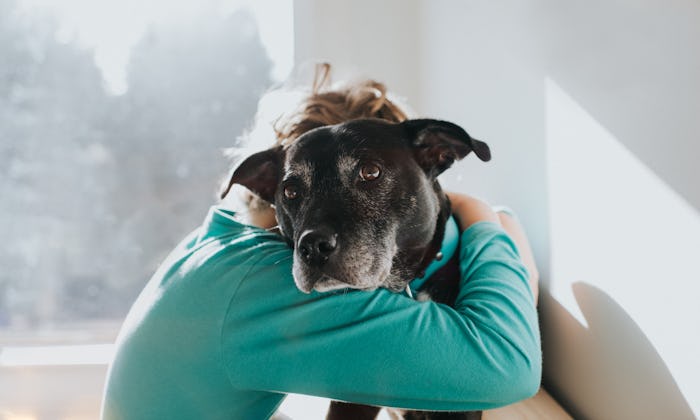Life

Here's What Experts Say About The Coronavirus Lingering On Your Pet's Fur
You take your dog on a walk and do your best to socially distance from neighbors on the street, but dogs being dogs, your pup finds its way to another person who excitedly welcomes it and gives it a few scratches and pets. It's all a very kind and polite interaction, but did it undo all of your quarantining? Can coronavirus live on your pet's fur and, in turn, expose you and your family to it?
Like most questions surrounding coronavirus, the answer is complicated. In an email to Romper, Director of Infection Prevention at University of North Carolina Hospitals, Emily Sickbert-Bennett, PhD, MS, explains "Coronaviruses can survive on different surfaces" like, perhaps animal fur, but "in order for a surface to be the source of transmission," there needs to be a perfect chain of events. While this chain of events "is technically possible", Sara Ochoa, D.V.M., veterinary consultant for doglab.com, tells Romper, "this would be a very rare way to transmit the coronavirus."
Dr. Sickbert-Bennett says hand-washing should be a priority when it comes to animals. "Infection prevention guidance has always advised to wash your hands after touching animals," she says, as it's the best way to "interrupt [the] chain of transmission" that has to occur in order for a virus to be transmitted from a pet to a human.
Truthfully, though, your pet may want to be a little more suspicious of you rather than the other way around. The FDA has found most animals that have tested positive for the virus did so "after having close contact with a person with COVID-19.," and the CDC recommends "[treating] pets as you would other human family members to protect them from possible infection."
Dr. Ochoa says pet owners who have tested positive for the virus "should avoid contact" with their pet, just like they would another human. If there's no getting around it, she stresses the importance of wearing face masks and proper hand washing before coming into contact with them.
With the likelihood of your pet passing the coronavirus to you being so low, there's no need to withhold snuggles or belly rubs. As long as you do your best to keep them away from neighbors and practice the same good hygiene as always, you can feel confident that they won't put you at risk.
If you think you’re showing symptoms of coronavirus, which include fever, shortness of breath, and cough, call your doctor before going to get tested. If you’re anxious about the virus’s spread in your community, visit the CDC for up-to-date information and resources, or seek out mental health support. You can find all of Romper’s parents + coronavirus coverage here.
Experts:
Sara Ochoa, D.V.M., Veterinary Consultant for doglab.com
Emily Sickbert-Bennett, Ph.D., M.S., Director of Infection Prevention at UNC Hospitals